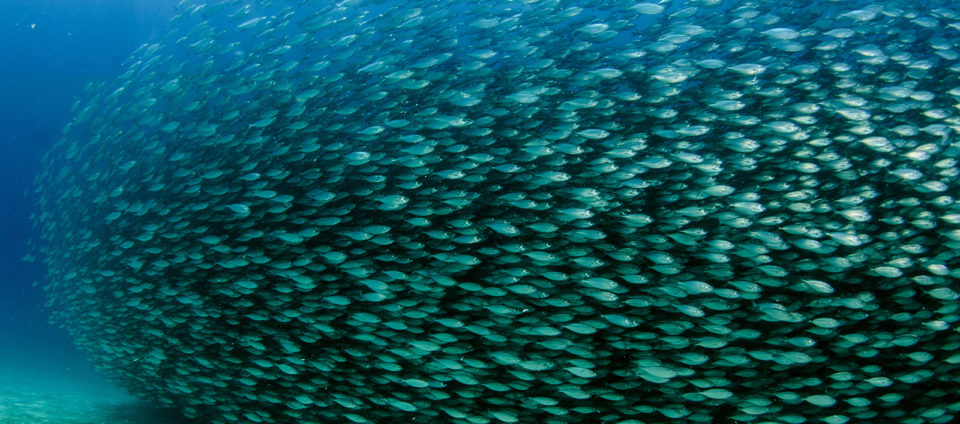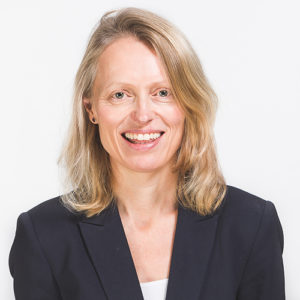Veteran fisheries expert Libby Woodhatch’s latest role her ‘most challenging’ to date

The IFFO RS Global Standard for Responsible Supply appointed a new executive chair earlier this year, following the retirement of industry stalwart Andy Jackson. Six months into the job, Libby Woodhatch told the Advocate that she is finally finding her feet in her “fascinating” new role.
Woodhatch, who had an attraction to all things marine from an early age, has worked in the seafood industry since earning a master’s degree in fisheries development and planning. Her roles – which range from long-term consultancy projects, to CEO of Seafood Scotland to head of advocacy for Seafish – have given her a deep insight into the complexity of the world of fisheries and aquaculture.
“Overseeing the IFFO RS vision for all global marine ingredients to be sourced from responsibly sourced fisheries products and produced in a safe manner, is probably my most challenging role to date,” she said.
Woodhatch explained that IFFO RS is an independent business-to-business certification program for the production of marine ingredients that works alongside the IFFO RS Chain of Custody for Responsible Supply (IFFO RS CoC), and the IFFO RS Improvers Programme (IFFO RS IP).

“The overall aim of the program is to enable marine ingredient producers to demonstrate their commitment to the responsible sourcing and safe production of raw materials,” said Woodhatch. “This is a vital area of work if fishmeal and fish oil are to remain as a credible ingredient in feed for aquaculture.”
The IFFO RS standard was first proposed in 2007 by the International Fishmeal and Fish Oil Organisation (IFFO). The group retained the IFFO brand, but is now known as The Marine Ingredients Organisation.
“Rapid growth of the global fishmeal and fish oil markets, together with growing concern over the sustainability of global fisheries and the fight against illegal, unreported and unregulated (IUU) fishing, meant there was an urgent need for a tool to enable industry to demonstrate responsible practice,” said Woodhatch.
It took several years to develop the standard, which uses the fishmeal plant as the unit of certification and addresses the sourcing of raw material by referring to the Food and Agriculture Organisation’s (FAO) Code of Conduct for Responsible Fisheries.
The first fishmeal plants were certified in 2010, which caused a rapid flurry of interest. By 2017, 135 plants in 17 different countries had gained IFFO RS certification.
“This means that more than 45 percent of the world’s combined production of marine ingredients is now IFFO RS compliant, and by the end of 2018, we estimate that this figure will rise to around 50 percent of global production,” said Woodhatch.
Credibility is assured through ISEAL associate membership, which gives reassurance to the value chain that the standard has been developed using a globally recognised framework and that it also complies with ISEAL’s codes of good practice related to assurance, impacts assessment and monitoring.
Woodhatch explained that when the IFFO RS standard was first developed, the initial focus was on single-species feed fisheries within well-developed fisheries management systems. However, as demand has grown, so too has the need for the marine ingredients sector to protect its position and reputation globally. The result is a collective need to work with fisheries that are more complex and to support them on an improvement journey.
“The changing nature of supply led to the development of the IFFO RS Improver Programme. This provides a mechanism by which fisheries that do not currently meet the IFFO RS requirements can work towards approval for certification along a structured pathway such as through a fishery improvement project (FIP) and obtain recognition for consistent progress towards achieving IFFO RS approval,” she said.
Collaboration over social and ethical issues is especially important as it is a complex field, with a great deal of effort being undertaken in an area where meaningful improvements can only be made by working together.
This work has been undertaken in collaboration with the aquaculture value chain, which welcomes assistance in developing additional supplies of responsibly sourced feed, according to Woodhatch.
“The latest FIP to be accepted onto the Improver Programme is the multi-stakeholder Ecuadorian small pelagics fishery. We have also launched multispecies fishery criteria to be tested in relevant fisheries such as those in Southeast Asia. The criteria have been developed to help us expand the IFFO RS IP to more complex fisheries, thereby driving change in capture fisheries, which is very exciting,” she said.
IFFO RS works in close collaboration with other standard holders, particularly those in the aquaculture value chain such as Best Aquaculture Practices (BAP). The aim is to ensure complementarity and the provision of complete assurance for the seafood supply chain. Woodhatch explained that BAP Standards Coordinator Dan Lee is both a member of the IFFO RS Governing Body Committee and the IFFO RS Improver Programme Acceptance Committee.
“BAP’s input as standard holders further up the aquaculture chain is key, as we need to ensure that IFFO RS-certified material meets their needs too. We are delighted that BAP recognizes and supports IFFO RS-certified material, which in turn provides a great pull factor for fishmeal plants,” said Woodhatch.
She believes that input from BAP and others will be even more critical as IFFO RS moves towards enhancing the level of social criteria within its standards and begins to address the need to extend this scope to vessels supplying raw material to the fishmeal factories.
“We are in the process of setting up a social and ethical committee to drive this initiative forward and I am delighted that Dan has agreed to be a part of this. IFFO RS will also be involved in the new, not-for-profit Global Seafood Assurances (GSA), the brainchild of Wally Stevens, which will address gaps in aquaculture and fisheries certification to provide complete and credible assurances for seafood and aquaculture supply chains,” she said.
Working in partnership with GSA will enable IFFO RS to avoid duplication of effort and to draw on the expertise of other standard holders to address gaps in the supply chain.
“Collaboration over social and ethical issues is especially important as it is a complex field, with a great deal of effort being undertaken in an area where meaningful improvements can only be made by working together,” said Woodhatch.
She is closely watching the migration of the UK’s Responsible Fishing Scheme from Seafish over to the GSA, and believes that it could provide one of the potential solutions to providing assurances on fishing vessels supplying the marine ingredients sector.
“There is much work to be done to bring the entire marine ingredients supply industry up to an acceptable standard, particularly in the field of tropical fishmeal, but I like a worthwhile challenge and I look forward to making a success of this one,” she said.
Follow the Advocate on Twitter @GAA_Advocate
Author
-
Nicki Holmyard
Nicki Holmyard has written about the seafood industry for longer than she cares to remember! A committed pescetarian, she is also a partner in the UK’s first fully offshore rope-grown mussel farm.
Tagged With
Related Posts

Aquafeeds
IFFO: Future contributions of marine ingredients in aquafeeds
Fishmeal is still the most nutritious source of protein for aquaculture diets, having a wide range of essential amino acids and a high digestibility, while fish oil is still the only commercially available source of long chain omega-3 for aquaculture diets – both are the foundation of aquafeeds.

Aquafeeds
Aquaculture Exchange: Andrew Jackson, IFFO
Aquaculture remains dependent on fishmeal and fish oil, crucial marine ingredients in aquafeeds, particularly at key life stages. Andrew Jackson, technical director at IFFO and one of the world’s foremost fishmeal experts, tells the Advocate that the two industries can coexist well into the future if properly managed.

Aquafeeds
Aquaculture Exchange: Rick Barrows
After 14 years with the USDA’s Agricultural Research Service, Rick Barrows talks about the importance of finding ‘complete’ and commercially viable alternative sources of omega-3 fatty acids and continuing innovation in the aquafeed sector.

Aquafeeds
SeaWeb Seafood Summit: Defining the future of aquafeed
At the Barcelona Seafood Summit, an expert panel discussed a sustainable future for aquafeeds. What stands between us and that future?


